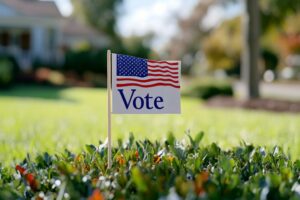During an election season, notably a presidential election, many Americans desire to publicize their vote for and support of a candidate by posting political yard signs on their property. But what about those living in a place governed by a community association like a condominium or homeowners association (HOA)?
Does the First Amendment Cover Political Yard Signs?
It’s a common misconception that the First Amendment of the United States Constitution restricts any action that would infringe on the freedom of speech. The actual language of the amendment states:
Congress shall make no law respecting an establishment of religion, or prohibiting the free exercise thereof; or abridging the freedom of speech, or of the press; or the right of the people peaceably to assemble, and to petition the Government for a redress of grievances.
The First Amendment applies to what are called “state actors”: i.e. it restricts the power of the government or those acting on behalf of the government. So if you are living in a property governed by an HOA, the question you need to ask yourself is whether or not your HOA is the government. In Pennsylvania, the answer is probably not.
PA Case Law Relating to Political Yard Signs 
While Pennsylvania lacks significant case law specifically relating to political signs, the right to have yard signs has been addressed by our appellate courts.
In Midlake on Big Boulder Lake Condominium Association v. Cappuccio, the Pennsylvania Superior Court reviewed whether a condo association could prohibit all signs in the community without board approval. In that case, the property owners (the Cappuccios) placed a “For Sale” sign in their window. While acknowledging that if a municipality tried to prohibit any signs on the property, that restriction would be a violation of the First Amendment, the court held that an association is not a governmental entity and the restriction is enforceable. The Court emphasized that when someone buys into a community, they contractually agree to follow its covenants and rules. The Court wrote:
One of the fundamental precepts which we recognize, however, is the individual’s freedom to contractually restrict, or even give up, those rights. The Cappuccios contractually agreed to abide by the provisions in the Declaration at the time of purchase, thereby relinquishing their freedom of speech concerns regarding placing signs on this property.
In Anelli v. Arrowhead Lakes Community Association, also involving a “for sale” sign, the Commonwealth Court reached the same conclusion.
Does this give an association unlimited power to randomly prohibit political signs? No. The association only has the power to enforce the restrictions written in its governing documents, particularly its declaration. While HOA’s have the power to pass “rules and regulations,” those rules and regulations themselves must be supported by the underlying governing documents of the HOA.
Can I Post my Political Yard Signs?
Given the nature of the issues involved, before enacting or enforcing covenants relating to signs or political signs, an HOA should consult with legal counsel. Similarly, before an owner in an HOA posts a political sign, they should review any condominium and planned community documents carefully (possibly with an attorney) to fully understand the scope and nature of the restrictions. Ideally one should know this before they purchase the home as a part of their due diligence. In many ways, you are surrendering what you may perceive to be your rights, which may include posting any signage in your yard or even window.
If an association wants to prohibit signs, or particularly political signs, it should review its governing documents carefully and consult an attorney as well, to ensure compliance with federal and state laws and constitutional rights.









